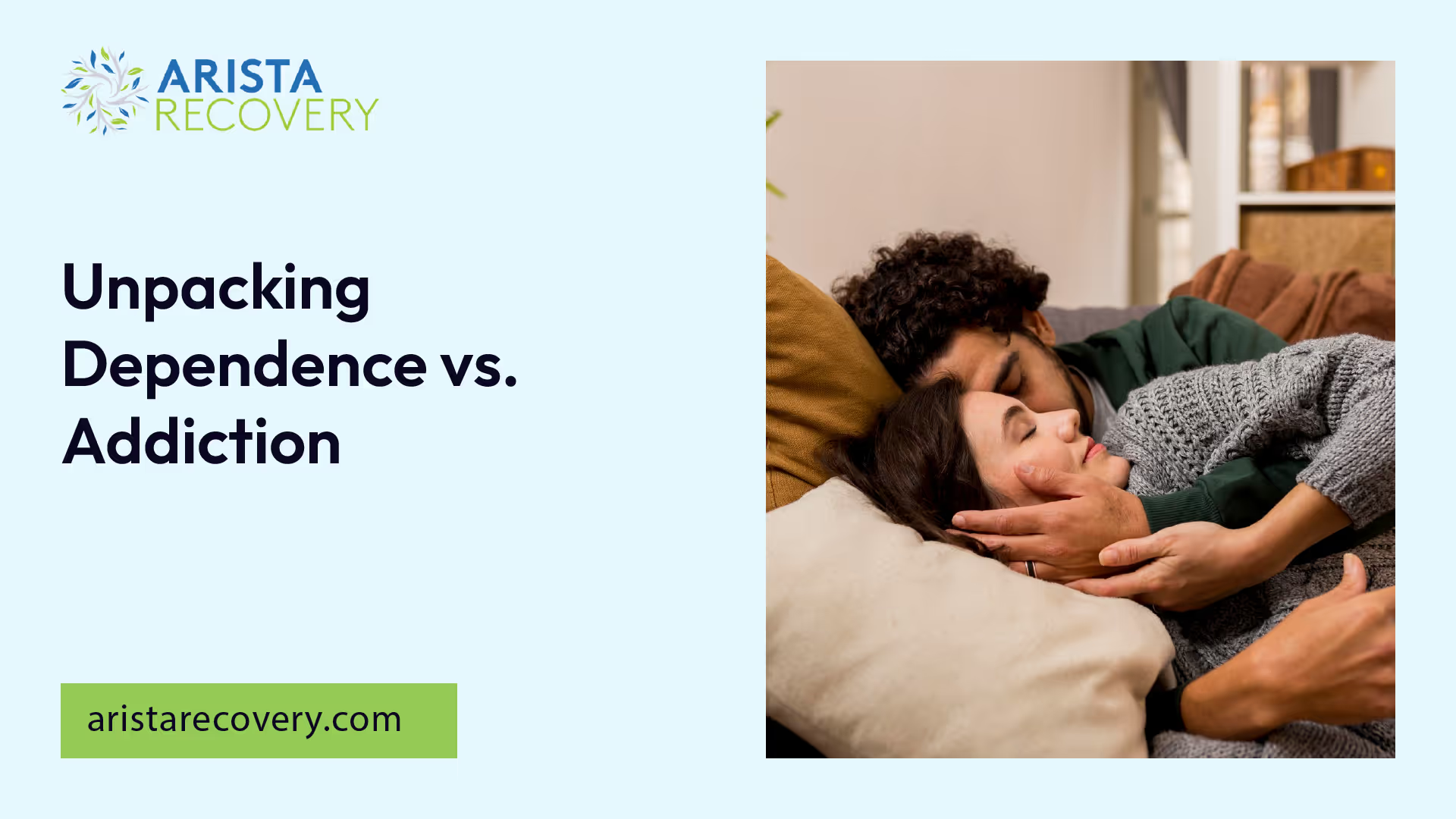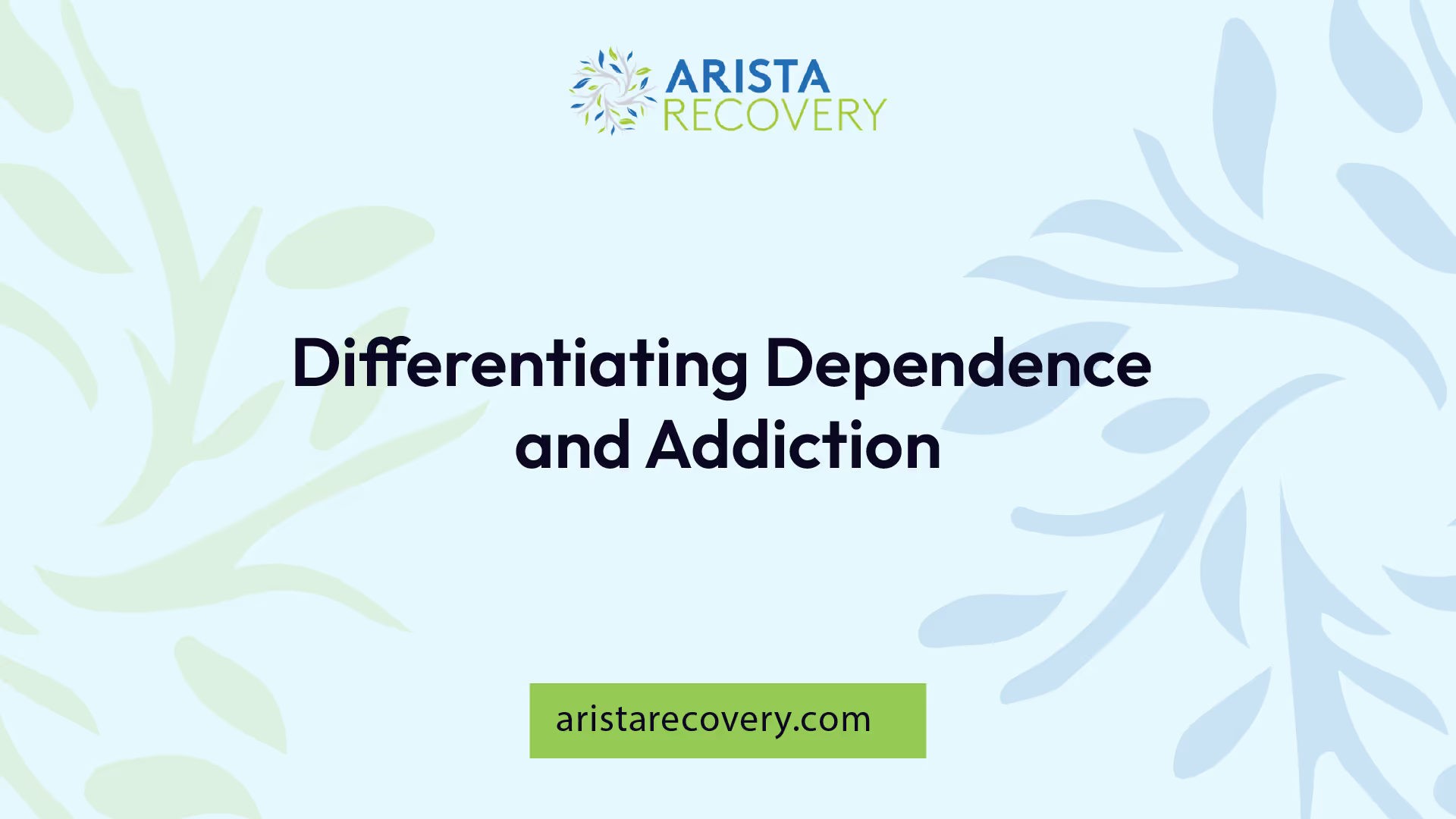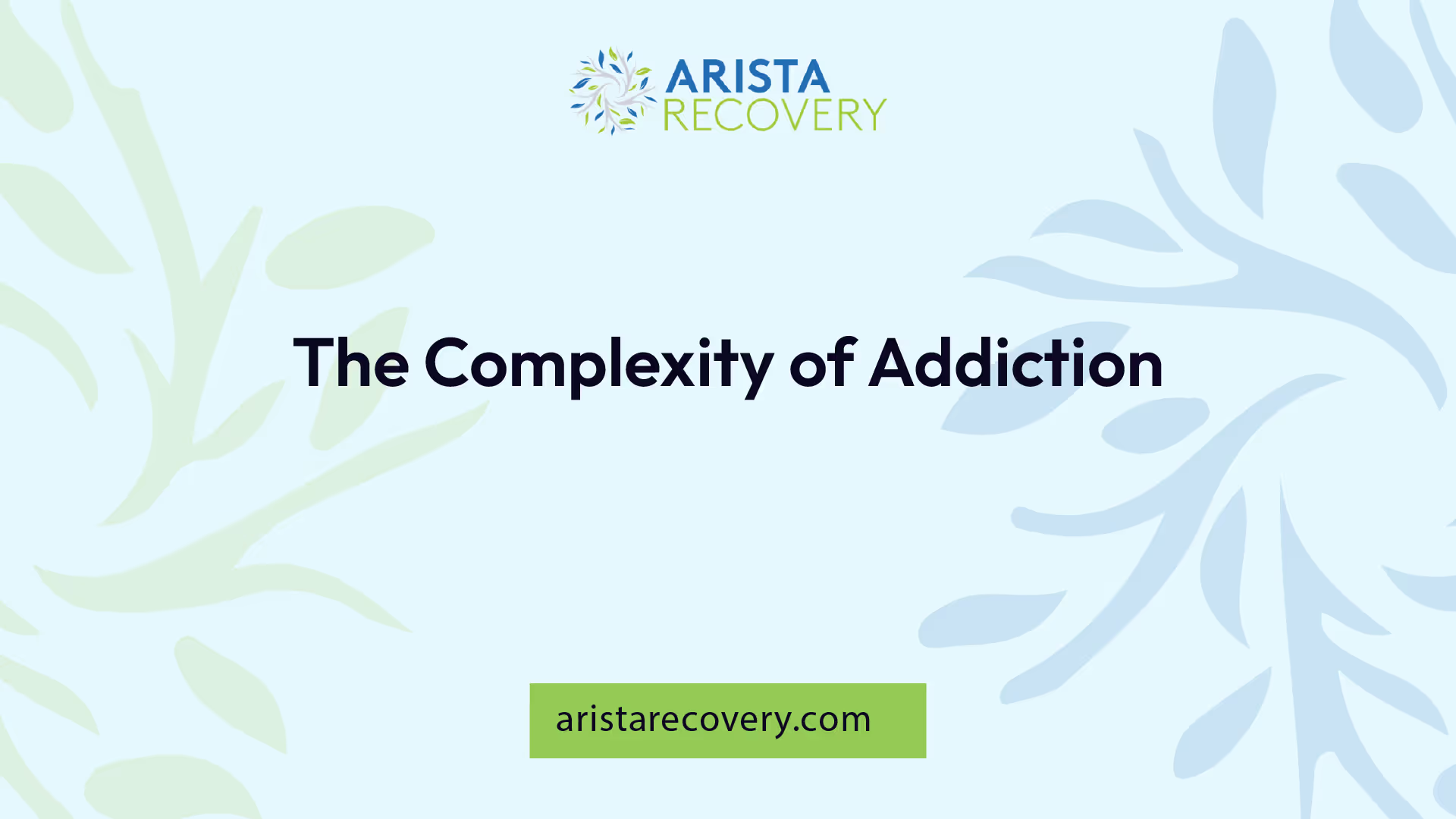Unpacking Dependence vs. Addiction

Understanding Substance Use Disorders
In the realm of mental health, understanding substance use disorders is crucial, particularly when differentiating between dependence and addiction.

Substance Use Disorder Overview
Substance use disorder (SUD) is a mental health condition that involves a problematic pattern of substance use, ranging from mild to severe, which leads to addiction. Key characteristics of SUD include an overpowering desire to use the substance, increased tolerance, and withdrawal symptoms when the substance use is halted [1].
At the severe end of the SUD spectrum lies addiction. Generally, the term "addiction" is used to refer to a chronic disease characterized by compulsive drug seeking and use, which becomes difficult to control, despite harmful consequences. While the initial decision to take drugs is voluntary for most people, repeated drug use can lead to brain changes that challenge an addicted person’s self-control and interfere with their ability to resist intense urges to take drugs [2].
It's important to note that substance use disorders are chronic, treatable medical conditions defined by continued substance use despite negative outcomes. The term "addiction" is not a formal diagnosis as such, and is used in various ways, sometimes to describe more serious presentations of substance use disorders.
Impact of Substance Use Disorders
Substance use disorders, including drug addiction, can lead to physical changes in the brain, causing physical addiction when the repeated use of a drug alters the way the brain experiences pleasure. The addicting drug can induce lasting changes to certain nerve cells in the brain, affecting neurotransmitter communication even after drug use stops.
Addiction is defined as a chronic, relapsing disorder characterized by compulsive drug seeking and use despite adverse consequences. It is considered a brain disorder, as it involves functional changes to brain circuits related to reward, stress, and self-control. These changes may persist even after drug cessation.
In the context of understanding substance use disorders and their impacts, it's important to understand the distinct difference between dependence and addiction. To learn more about this, refer to our section on 'Differentiating Dependence and Addiction' and 'The Complexity of Addiction'. Also, for those seeking help and support, we provide information on 'Professional Assistance' and 'Recovery Strategies' to navigate through the journey of overcoming addiction.
Differentiating Dependence and Addiction
Understanding the terms 'dependence' and 'addiction' is important when discussing substance use disorders. Both terms are often used interchangeably, but they have different meanings in the context of addiction treatment.

Physical Dependence vs. Addiction
Physical dependence refers to the physical symptoms of withdrawal and tolerance. These symptoms occur when the body has adapted to the presence of a substance, and withdrawal symptoms occur if the drug is suddenly stopped or the dosage is reduced.
On the other hand, addiction is marked by a change in behavior caused by biochemical changes in the brain after continued substance abuse. It's characterized by having more of a mental component. Dependence is physical; addiction is neurological. They’re independent of each other. It’s possible to be dependent on a drug without being addicted [6].
For more detailed information on physiological dependence, you can visit our article on physiological dependence.
Psychological Dependency Explained
People are psychologically dependent when a drug is so central to their thoughts, emotions, and activities that the need to continue its use becomes a craving or compulsion despite negative consequences.
Psychological dependency is defined as dependence on a substance, which may not always lead to physical dependence. Mental dependence is when the use of a substance is a conditioned response to an event or feeling, known as "triggers," which strongly influence addictive behavior by setting off biochemical changes in the brain.
Brain chemistry varies among individuals, making it crucial to understand how substances affect mental and emotional states for diagnosis and treatment. Some addiction therapists believe that psychological dependence is harder to overcome and requires more extensive aftercare, as individuals may continue to experience psychological consequences even after the substances are out of their bodies.
In the context of 'dependence vs. addiction', understanding these nuances can be crucial in identifying the right treatment strategies. For more detailed information on dealing with dependence and addiction issues, you can visit our articles on how to help son with drug dependence and drug alcohol dependence leads to addiction.
The Complexity of Addiction
Confronting the issue of 'dependence vs. addiction' involves understanding the complexity of addiction. Addiction is a multifaceted and chronic disease, influenced by several factors.

Chronic Nature of Addiction
Addiction is characterized as a chronic disease, marked by drug seeking and use that is compulsive, or difficult to control, despite harmful consequences. The initial decision to take drugs is voluntary for most individuals, but repeated drug use can lead to brain changes that challenge a person's self-control and interfere with their ability to resist intense urges to take drugs.
This chronic condition significantly impacts health, relationships, and overall quality of life. Thus, it's crucial to seek help as soon as signs of addiction develop. Furthermore, addiction is considered a "relapsing" disease, as those in recovery from drug use disorders are at increased risk for returning to drug use even after years of not taking the drug.
Factors Influencing Addiction Risk
Several factors can influence the risk of addiction. Biological factors include aspects such as genes, stage of development, gender, and ethnicity. It is estimated that genes and environmental factors affecting gene expression (epigenetics) contribute to 40-60% of a person's addiction risk.
In addition, environmental factors such as family, school, and neighborhood conditions can increase a person's risk of addiction. Factors like exposure to drugs, stress, and peer influences play a significant role in determining addiction risk.
People of any age, sex, or economic status can become addicted to a drug, and certain factors can influence the likelihood and speed of developing an addiction. Factors such as genetics, environment, and underlying mental health conditions can play a role in the development of drug addiction.
The initial decision to take drugs is usually voluntary, but continued use can impair a person's self-control, leading to addiction. Brain imaging studies of individuals with addiction reveal physical changes in brain areas crucial for judgment, decision-making, learning, memory, and behavior control, explaining the compulsive nature of addiction [5].
Understanding these complexities can be vital in treating opioid dependence or other types of substance use disorders. The more we comprehend about the nature of addiction and the factors that contribute to it, the better equipped we are to fight it.
Treatment and Recovery
Stepping into the realm of recovery from substance use disorders requires a well-rounded understanding of the available treatment options and strategies to prevent relapse. This knowledge aids in navigating the journey from dependence to living a life free from addiction.
Treating Substance Use Disorders
Treatment for drug addiction isn't a cure; however, it is manageable and can be successfully treated. Research indicates that a combination of addiction treatment medicines with behavioral therapy ensures the best chance of success for most patients. The treatment should be tailored to each patient's drug use patterns and any co-occurring medical, mental, and social problems to lead to continued recovery.
For treating addictions to opioids, medication should be the first line of treatment, often combined with behavioral therapy or counseling. There are medications available for treating addiction to alcohol and nicotine as well. On the contrary, for stimulants or cannabis addictions, no medications are currently available, and treatment consists of behavioral therapies [9].
Behavioral therapies in drug addiction treatment help individuals modify their attitudes and behaviors related to drug use, enabling them to handle stressful situations and triggers that might lead to relapse. These therapies can also improve the effectiveness of medications and help individuals remain in treatment for longer periods. For more information on treating substance use disorders, visit our article on treating opioid dependence.
Preventing Relapse
In the context of substance use disorders, it's important to understand that relapse doesn't signify treatment failure, but rather, it's a part of the recovery process. It's essential for individuals to resume treatment, modify it, or try another treatment if they relapse [9].
Relapse can be dangerous or deadly for some drugs, especially if the individual uses as much of the drug as they did before quitting. Overdose can occur because the body is no longer adapted to the previous level of drug exposure, leading to uncomfortable feelings, life-threatening symptoms, or death.
Preventing relapse is a crucial aspect of recovery. This involves continual learning and practicing of new skills, staying connected with a recovery community, and maintaining a healthy lifestyle. For more guidance on preventing relapse, explore our article on how to help son with drug dependence.
Remember, the journey from dependence to freedom from addiction is unique to each individual. Stay patient, stay committed, and always seek professional help when needed. Your journey towards recovery is a courageous one, and with the right resources and support, a life free from addiction is within reach.
Addiction as a Public Health Concern
The issue of addiction extends far beyond the individuals suffering from it. It impacts families, communities, and society as a whole, necessitating a broader public health response. Understanding the distinction between dependence vs. addiction is crucial in this regard.
Addressing Addiction in Society
Addiction is a complex issue that needs to be treated as a public health problem, not a crime. Over 65% of the 2.3 million people incarcerated in the U.S. met the criteria for a substance use disorder in 2010, yet only 11% of those received treatment. Those with a history of addiction often face obstacles in obtaining employment and are likely to be diagnosed with another mental illness at some point in their lives.
Addressing addiction as a societal issue requires a multifaceted approach that includes prevention, treatment, and recovery support. It's important that society recognizes the chronic nature of addiction, and the need for ongoing support and services to help individuals maintain recovery.
Public Health Solutions
Prevention is key in tackling addiction. Drug use and addiction are preventable, and prevention programs involving families, schools, communities, and the media have been shown to be effective in preventing or reducing drug use and addiction. Education and outreach play a vital role in helping people understand the possible risks of drug use.
Prevention programs can be universal, selected, or indicated, designed to prevent substance use and negative outcomes related to it. Notably, these evidence-based prevention strategies have long-term, cost-saving benefits for personal and public health, with positive effects lasting for generations.
Risk factors for substance use and substance use disorders can include genes, individual characteristics, social environment, and the impact of these factors can change at different life stages. Conversely, protective factors such as individual traits like optimism, healthy family and peer relationships, and financial stability can help prevent substance use and the development of substance use disorders.
In conclusion, the complexities of addiction make it a significant public health concern. Addressing addiction requires a comprehensive approach that includes education, prevention, treatment, and recovery support. By recognizing addiction as a chronic disease, society can move towards more effective and compassionate solutions. For those who are struggling, seeking professional assistance and employing proven recovery strategies can be an essential part of the journey towards health and wellbeing.
Seeking Help and Support
When dealing with the complex issue of 'dependence vs. addiction', seeking professional assistance and adopting the right recovery strategies play a crucial role in successfully managing addiction.
Professional Assistance
Substance use disorders, encompassing both physical and psychological dependency, are complex and can be influenced by various factors such as lifestyle, environment, and individual brain chemistry. Seeking professional help and appropriate therapies are crucial steps in recovery.
Treatment for drug addiction generally isn’t a cure, but addiction is treatable and can be successfully managed. People recovering from an addiction will be at risk for relapse for years and possibly for their whole lives. Therefore, it's essential to seek help as soon as signs of addiction develop, as it can significantly impact health, relationships, and overall quality of life.
Research shows that combining addiction treatment medicines with behavioral therapy ensures the best chance of success for most patients. Treatment approaches tailored to each patient’s drug use patterns and any co-occurring medical, mental, and social problems can lead to continued recovery.
Recovery Strategies
Recovery from a substance use disorder, whether it's physiological dependence or addiction, requires a comprehensive approach.
Behavioral therapies in drug addiction treatment help individuals modify their attitudes and behaviors related to drug use, enabling them to handle stressful situations and triggers that might lead to relapse. These therapies can also improve the effectiveness of medications and help individuals remain in treatment for longer periods.
Prevention is also a crucial part of recovery strategies. The best approach to preventing drug addiction is to avoid taking the drug altogether. If a healthcare provider prescribes a potentially addictive drug, it's essential to use it cautiously and follow the instructions provided. Healthcare providers should prescribe these medications at safe doses, monitor their use, and address any concerns about dosage adjustments with the patient.
Remember, seeking professional help and following the right recovery strategies are essential for managing and overcoming addiction. It's okay to reach out for help and support. Visit our resources on how to help son with drug dependence and treating opioid dependence for more guidance.
References
[2]:
[3]:
[4]:
[5]:
[6]:
[7]:
[8]:
[9]:
You’re not alone in this.
When mental health challenges and addiction intersect, it can feel isolating. At Arista, we offer compassionate, evidence-based, and trauma-informed care to help you heal, grow, and move forward.
You’re not alone in this.
When mental health challenges and addiction intersect, it can feel isolating. At Arista, we offer compassionate, evidence-based, and trauma-informed care to help you heal, grow, and move forward.
Support that moves with you.
You’ve taken a brave first step. At Arista Recovery, we’re here to help you continue with best-in-class care designed for long-term healing and support.
.webp)






